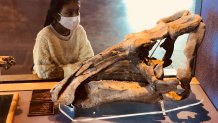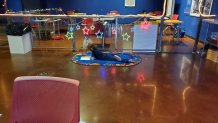Virtual schooling meets an extended version of "Night at the Museum."
Imagine logging on to online classes next to a giant dinosaur or taking a break for a private experience with a planetarium.
The Fort Worth Museum of Science and History is launching a new program taking virtual learning to another level.
The Little Scholars program is allowing 1st through 5th graders to, basically, do their virtual classes from inside the exhibit halls.
It's an interesting example of how educators are trying to find new ways to get kids engaged in learning during this strange time.
“The whole point of the museum is to serve our community. And we realized that the best way to serve it is using our facility to support them," said Amber Shive, director of education at Fort Worth Museum of Science and History.
Usually around this time of year, the museum is filled with field trips but since March, they scaled their education outreach to just online videos while the space was closed to the public for months.
Local
The latest news from around North Texas.
And as school started back up this fall semester, Shive said they realized that learning was going to look so much different for the unforeseeable future.
"Right now in Fort Worth ISD, about half the students have decided to stay virtual for the semester at least. And we're here to support them,” Shive said. “Everything in the museum is all about education and encouraging exploration and inviting students to experience learning."
That's where the idea for the new program came into play. Shive said they ran a pilot program with just Fort Worth ISD students in October and it went well.

Now, the program is expanding to take on several other school districts in the area.
"Virtual learning is hard for everybody. It's hard for the students, it's hard for the parents that are working jobs. It's hard for the students that don't have access to technology,” Shive said. “And that's when we realized, how can we best use the museum? And that was to invite virtual learners here to do their virtual learning here."
Here's how it works. Students are placed in pods of no more than 10 and are spread out across the museum's 166,000 square foot facility to use the exhibits as their classrooms for their online schooling.
Masks are enforced and there is a screening and temperature check before students arrive each day.
Wi-Fi and laptops are provided. A museum facilitator and assistant are on hand to help kids log in and answer questions.
Then in between classes and during breaks, the staff puts together science projects, live animal showings and other engaging, socially-distant activities.

For now, the museum is closed to the public Monday through Friday just for these students. It is open to the public on the weekends.
There is a tuition fee but the museum is offering scholarships to be able to sign up. The program is first come first serve and there will be a waitlist once spots fill up. Parents are asked to commit to a month with the program and from there they can choose to extend. There are also discounts for museum members.
Before applying, parents are encouraged to read the program's guidebook.



